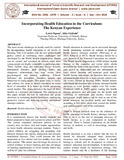| dc.description.abstract | The most recent challenges in health could be tackled by incorporating health education at all levels of learning. This is in tandem with the new global health policy aimed at combating these challenges and developed by the World Health Organization. Health can be created and sustained in schools since most young people are highly vulnerable to particular risks. These include drug and substance abuse, sexually transmitted diseases, poor feeding dangerous relationships that may psychological and mental wellbeing. Schools influence the perception, attitudes, behaviour of young people. This paper seeks to clarify and enforce the need of health education in every level of education. It is based on health promoting social models. The young person is the heart of these models in a dynamic environment. The objectives of this paper include the role of individual and group decisions in sustaining healthy behaviour, reinforcing protective factors and reducing harmful perceptions amongst students. Health education in schools can be advocated through health promoting sessions in schools to promote health literacy amongst students. (McCuaig et al, 2012, Kibui et al 2015). Health literacy should be a core element of the National Curriculum for schools. The World Health Organisation (1998) defines health literacy as the cognitive and social skills which determine the motivation and ability of individuals to gain access to, understand and use information in ways which promote and maintain good health. Health literate individuals are therefore able to make informed health decisions to exert greater control over life events (Shohet & Renaud, 2006). Health literate
individuals are therefore able to make informed health decisions to exert greater control over life events. (Nutbeam (2009 & 2000) agrees, stating that health literacy promotes and advocates for the health and
wellbeing of individuals and society. Given this background, health literacy can be seen as one of the prime resources for positive health and therefore, acquiring it will assist movement toward the health-ease (salutogenesis) end of the continuum | en_US |

